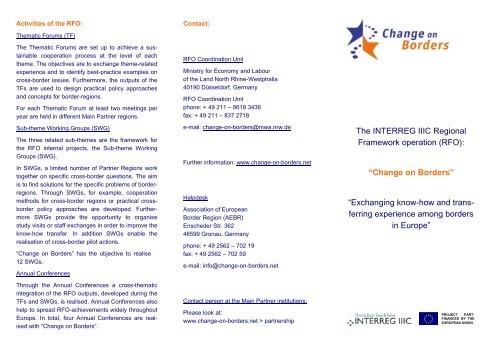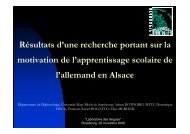Xxx Xxx Xxx Xxx Xxx Xxx Xxx Xxx Xxx Xxx Xxx Xxx Xxx Xxx Xxx Xxx ...
Xxx Xxx Xxx Xxx Xxx Xxx Xxx Xxx Xxx Xxx Xxx Xxx Xxx Xxx Xxx Xxx ...
Xxx Xxx Xxx Xxx Xxx Xxx Xxx Xxx Xxx Xxx Xxx Xxx Xxx Xxx Xxx Xxx ...
Create successful ePaper yourself
Turn your PDF publications into a flip-book with our unique Google optimized e-Paper software.
Activities of the RFO:<br />
Contact:<br />
Thematic Forums (TF)<br />
The Thematic Forums are set up to achieve a sustainable<br />
cooperation process at the level of each<br />
theme. The objectives are to exchange theme-related<br />
experience and to identify best-practice examples on<br />
cross-border issues. Furthermore, the outputs of the<br />
TFs are used to design practical policy approaches<br />
and concepts for border-regions.<br />
For each Thematic Forum at least two meetings per<br />
year are held in different Main Partner regions.<br />
Sub-theme Working Groups (SWG)<br />
The three related sub-themes are the framework for<br />
the RFO internal projects, the Sub-theme Working<br />
Groups (SWG).<br />
In SWGs, a limited number of Partner Regions work<br />
together on specific cross-border questions. The aim<br />
is to find solutions for the specific problems of borderregions.<br />
Through SWGs, for example, cooperation<br />
methods for cross-border regions or practical crossborder<br />
policy approaches are developed. Furthermore<br />
SWGs provide the opportunity to organise<br />
study visits or staff exchanges in order to improve the<br />
know-how transfer. In addition SWGs enable the<br />
realisation of cross-border pilot actions.<br />
“Change on Borders” has the objective to realise<br />
12 SWGs.<br />
Annual Conferences<br />
Through the Annual Conferences a cross-thematic<br />
integration of the RFO outputs, developed during the<br />
TFs and SWGs, is realised. Annual Conferences also<br />
help to spread RFO-achievements widely throughout<br />
Europe. In total, four Annual Conferences are realised<br />
with “Change on Borders”.<br />
RFO Coordination Unit<br />
Ministry for Economy and Labour<br />
of the Land North Rhine-Westphalia<br />
40190 Düsseldorf, Germany<br />
RFO Coordination Unit<br />
phone: + 49 211 – 8618 3438<br />
fax: + 49 211 – 837 2718<br />
e-mail: change-on-borders@mwa.nrw.de<br />
Further information: www.change-on-borders.net<br />
Helpdesk<br />
Association of European<br />
Border Region (AEBR)<br />
Enscheder Str. 362<br />
48599 Gronau, Germany<br />
phone: + 49 2562 – 702 19<br />
fax: + 49 2562 – 702 59<br />
e-mail: info@change-on-borders.net<br />
Contact person at the Main Partner institutions:<br />
Please look at:<br />
www.change-on-borders.net > partnership<br />
The INTERREG IIIC Regional<br />
Framework operation (RFO):<br />
“Change on Borders”<br />
“Exchanging know-how and transferring<br />
experience among borders<br />
in Europe”<br />
PROJECT PART-<br />
FINANCED BY THE<br />
EUROPEAN UNION
INTERREG IIIC:<br />
INTERREG IIIC is an EU-programme to promote<br />
interregional cooperation between regional and<br />
other public authorities across the entire EU territory<br />
and neighbouring countries. It allows regions<br />
to work together in common projects and develop<br />
networks of cooperation. The overall aim is<br />
to improve the effectiveness of regional development<br />
policies and instruments through largescale<br />
information exchange and sharing of experience<br />
(networks) in a structured way. Three<br />
types of operations can be funded: Networks, Individual<br />
projects and Regional Framework Operations.<br />
The INTERREG IIIC programme is financed by<br />
the European Regional Development Fund<br />
(ERDF) and co-financed by national project partners.<br />
The application period is 2002-2006. All activities<br />
have to be finalised by end of 2008.<br />
Regional Framework Operation (RFO):<br />
A Regional Framework Operation (RFO) is composed<br />
of a group of regional authorities or<br />
equivalent bodies aiming at exchanging experience<br />
on methodology and project-based activities.<br />
This strategic framework is a kind of “miniprogramme”<br />
where the partners can choose the<br />
activities to be funded. Each RFO should address<br />
a limited range of subjects relevant to the<br />
regions participating, thus covering a limited<br />
range of smaller projects.<br />
The RFO “Change on Borders“:<br />
Duration: November 2003 – October 2007<br />
Total Budget: 8,2 m EUR<br />
EU funding: 4,9 m EUR<br />
Partnership:<br />
Cartography: Province of Overijssel<br />
25 border-regions of the NUTS I and II - level from 15 European<br />
countries participate in the RFO<br />
1 Lead Partner Region: North Rhine-Westphalia (DE)<br />
2 South Aegean Region (GR)<br />
4 Region of Navarra (ES)<br />
5 Region of Andalucia (ES)<br />
7 Bavaria (DE)<br />
8 Region of Friuli-Venezia Giulia (IT)<br />
9 Lower Austria (AT)<br />
10 Upper Austria (AT)<br />
11 Province of Gelderland (NL)<br />
12 Province of Limburg (NL)<br />
13 Province of Overijssel (NL)<br />
14 North Karelia / East Finland (FI)<br />
15 Saxony (DE)<br />
16 Värmland (SE)<br />
17 Lower Saxony (DE)<br />
18 Lublin (PL)<br />
19 Slovenia (SI)<br />
20 Euroregion Nenumas (LT)<br />
21 East Macedonia-Thrace (GR)<br />
22 Regio Basiliensis (CH)<br />
23 Autonomous Province of Bolzano/Bozen (IT)<br />
25 Euroregion Nisa (CZ)<br />
26 Alsace (FR)<br />
27 Hajdu-Bihar (HU)<br />
28 Rhone-Alps (FR)<br />
With “Change on Borders” for the first time such<br />
a large number of regions have committed themselves<br />
to working together in a RFO.<br />
Themes of cooperation in “Change on<br />
Borders”:<br />
“Change on Borders” consists of 3 thematic<br />
themes with three constant related sub-themes.<br />
They provide the structure for the cooperation.<br />
Promoting an integrated, well coordinated and<br />
environmentally friendly development of crossborder<br />
areas<br />
1. Cooperation among regions with similar<br />
geographical features<br />
2. Governance in border regions<br />
3. Environmentally friendly development &<br />
water management<br />
Further development of the economic fabric and<br />
of the labour market in (cross-) border regions<br />
1. Development of SMEs, R&D and innovation<br />
in border regions<br />
2. Cross-border labour market development<br />
3. Tourism development in border regions<br />
Promoting the socio-cultural integration between<br />
border regions and support closer contacts<br />
among individual citizens<br />
1. Strengthening of social cohesion in border<br />
regions<br />
2. Training, education and cross-border<br />
mobility<br />
3. Culture, media & people-to-people activities



